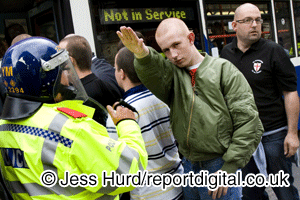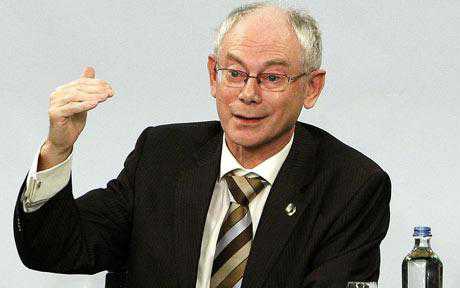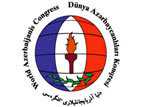Category: EU Members
European Council decided to open accession negotiations with Turkey on 17 Dec. 2004
-

Racist Terrorism on rise, Businessman bankrolls ‘street army’
By Nick Lowles
A middle-age, respectable looking man has emerged as a key figure behind the English Defence League. Alan Lake, a 45-year-old businessman from Highgate, North London, sees the EDL as a potential “street army” willing to be deployed against what they claim is rising Islamisation of modern Britain.

Lake, who claims to have made money through computers, runs a series of intranet services for far-right groups across the world. Addressing an anti-Islam conference in Sweden last month, organised by the far-right Swedish Democrats, he told delegates it was necessary to build an anti-Jihad movement. He spoke of the need for “people that are ready to go out in the street” and boasted that he and his friends had already begun to build alliances with “football supporters”.
“We are catching a baby at the start of a gestation,” Lake later told The Guardian. “We have a problem with numbers. We have an army of bloggers [on the far right] but that’s not going to get things done.
“Football fans are a potential source of support. They are a hoi polloi that gets off their backsides and travels to a city and they are available before and after matches.”
In addition to funding materials and publicity, Lake has established a website that he hopes will become a clearing house for the EDL and like-minded organisations. He says that people in the movement must choose their roles. Some can debate on forums, some can be experts on the Koran. He is, however, quick to distance himself from fascist organisations and one of his only demands of the EDL in return for his funding is that it distances itself from groups such as the British National Party.
Indeed, Lake appears to want to build alliances with all groups who might fall foul of the strict Islamic code, including lesbian and gay organisations, other religions and ethnic groups and supporters of free speech.
Lake wants the message to be short and easy. At the Swedish conference he announced a manifesto based on four freedoms: free speech, democracy, equality in law and cultural tolerance, with no exemptions for any ideology or religion.
He also stressed the urgency of the issue, claiming that within 40 years Muslims would be in the majority.
Lake’s offer to finance the EDL appeals to the Luton division, who remain at the EDL’s core. What began as a local reaction to the protest by a handful of Islamic extremists at a parade by the Royal Anglian Regiment in March has mushroomed into a national network that has increasingly been under the media spotlight due to several clashes in cities around the country.
Violence has already occurred in Luton, Birmingham and Harrow and further EDL events are planned for Manchester, Leeds, Swansea and Glasgow.
The EDL is run by 15 key people across the country who co-ordinate activists via email and social networking sites, such as Facebook. The group lacks a coherent message or vision, and even within its core, the EDL means different things to different people. Indeed, none of the 15 so-called leaders appears to have actually met all the others.
The EDL seems to have become an umbrella name for a number of existing anti-Islam groups, such as the Birmingham-based British Citizens Against Muslim Extremists, the Welsh Defence League and March for England.
While the group will claim to be open to anyone it remains centred around the football hooligan network and in particular gains support from the football gangs of Luton, Aston Villa, QPR, Southampton, Bristol Rovers, West Bromwich Albion and Wolves.
It has become apparent that some in Luton EDL have become uneasy over being linked to the BNP and far-right politics. For some this is a genuine aversion, while others might have been persuaded of this by Lake, who appears acutely aware of its negative impact on the group.
However, it is also clear that some other EDL leaders, in different parts of the country, have no problem with being linked to rightwing groups. The newly formed Scottish Defence League has known fascists at its core, while the Swansea Division shares many of its followers with the Swansea Jack hooligan group, which in turn supplies activists to the local BNP.
At the EDL protest in Birmingham fascists and rightwing extremists were clearly visible, some happily giving Nazi salutes. They included Chris Renton, a BNP supporter from Weston-super-Mare, who runs their website.
As publicity about the EDL continues, the group is likely to grow across the country. New units will form and new activists will take to the streets. Whatever Lake’s wishes it is unlikely that he will be able to direct EDL philosophy and actions too tightly. By its very nature and its core activity – taking to the streets – the EDL will attract people not averse to violence, particularly around the football hooligan network, and hardcore racists keen to use the group to spread racial hatred.
Hope Not Hate
-

EU president: Herman Van Rompuy opposes Turkey joining
The poetry-loving favourite to become the first president of Europe, Herman Van Rompuy, is also a hard-line opponent of Turkey’s bid to join the European Union because it is an Islamic country.

Herman Van Rompuy, Belgium’s Prime Minister, has in the past spoken out against Turkish EU membership because, he warned, it would dilute Europe’s Christian heritage.
His position on the issue is so strong that he has won the support of Vlaams Belang, the controversial far-right Flemishh anti-immigrant party in Belgium.
Speaking five years ago, as an opposition politician, Mr Rompuy, a Christian Democrat, argued that Muslim Turkey could not be considered a candidate for EU membership.
“Turkey is not a part of Europe and will never be part of Europe. An expansion of the EU to include Turkey cannot be considered as just another expansion as in the past,” he said.
“The universal values which are in force in Europe, and which are fundamental values of Christianity, will loose vigour with the entry of a large Islamic country such as Turkey.”
Filip Dewinter, a Vlaams Belang leader, said: “We are entirely in agreement with Van Rompuy over this question and are convinced he will defend this point of view as President of the EU. It is for this reason we openly support him.”
Mr Van Rompuy’s opposition to Turkey is set to cement British and East European opposition to him during Thursday’s summit dinner to appoint a President and Eu foreign minister.
The Telegraph
-

Rapprochement between Ankara, Teheran worries Brussels
Published: Tuesday 17 November 2009Policymakers and influential media warned that Turkey’s developing ties with Iran could be counterproductive to the EU’s efforts to convince Teheran that it should abandon its nuclear weapons programme.
“Policymakers in the West are getting worried that Turkey’s growing ties with Iran – by lessening that country’s sense of isolation – may frustrate diplomatic efforts to prevent Tehran from building a nuclear bomb,” writes Katinka Barysch of the Centre of European Reform (CER) in a paper published on 4 November.
Relationships between Turkey and Iran are on the upturn. On 27-28 October, Turkish Prime Minister Recep Tayyip Erdogan embarked on a two-day visit to Iran. There he met President Mahmoud Ahmadinejad and Supreme Leader Ayatollah Ali Khamenei. The visit was also an occasion to discuss gas transit, trade and energy agreements.
“The Erdogan government values its relationship with Iran as part of its ‘zero problem’ neighbourhood policy. Having been more or less isolated in the region only 20 years ago, Turkey now has flourishing political and trade links with most of its immediate neighbours,” Barysch writes.
This trip was anticipated in an interview with the Guardian newspaper, which saw the Turkish prime minister state that Iran was Turkey’s friend. “As a friend so far we have had very good relations and have no difficulty at all.” During his stay, Erdogan also stressed that the Iranian nuclear project is “an energy project that is peaceful and humanitarian”. This assertion contradicts the Commission’s 2009 progress report, which states that “Turkey supports the EU position on Iran’s nuclear programme”.
The Iran-Turkey relationship is also motivated by economic interests. “Trade between Turkey and Iran has been growing fast in recent years, to reach an estimated $6 billion in 2008. Politicians from both sides say they want to see that figure double or even triple over the next 5-10 years,” Barysch notes.
European opinion is divided. “Some European countries say Turkey’s improved ties with Iran could help EU policy in the Middle East and boost world powers’ efforts to stop Iran developing a nuclear bomb. Others fear Ankara could be turning its back on Europe and its policy could hinder talks on Iran’s nuclear enrichment programme by reducing Tehran’s isolation,” writes Timothy Heritage of Reuters.
Stronger scepticism towards Ankara’s position can be found in Germany, where German Chancellor Angela Merkel is said to have raised concerns about the rapprochement between Turkey and Iran. Officials have also pointed to the increasing difficulties emerging within NATO over friction between Turkey and Israel.
Turkey’s foreign policy ambitions are facing a dilemma. “As a long-standing NATO member and a country negotiating for EU membership, Turkey is expected to align itself with the US and Europe. As a regional power, Turkey will want to act independently and avoid antagonising its neighbours. It is not clear how long Ankara will be able to avoid tough choices,” Barysch concludes.
Recently, Turkish Foreign Minister Ahmet Davutoglu told journalists in Brussels that his country was in fact helping the West during ongoing tensions over Iran’s nuclear programme. He said his country was pursuing a policy of “zero problems” with its neighbours, with all of which he said relations were “very good” (EurActiv 05/10/09).
-

European Azerbaijanis Congress and Azerbaijani-Turkish Diaspora Organizations Coordination Council to hold joint meeting
Baku – APA. European Azerbaijanis Congress and Azerbaijani-Turkish Diaspora Organizations Coordination Council will hold joint meeting on November 21-22, 2009 in Frankfurt, Germany, press service of the State Committee for Diaspora Activities told APA. The committee put forward this initiative because of addresses of the European Azerbaijanis Congress and Turkish communities of European countries. Series of important events in the region in 2009, particularly signing of Turkish-Armenian protocols about establishment of diplomatic relations and development of bilateral relations caused serious concern and protest of the Azerbaijani and Turkish Diasporas, said the addresses. The Diaspora organizations said the opening of Turkish-Armenian borders without solution of Nagorno Karabakh problem was unacceptable and they supported the position of Azerbaijan Republic.Government officials and parliamentarians of Azerbaijan and members of the European Azerbaijanis Congress and Azerbaijani-Turkish Diaspora Organizations Coordination Council will attend the two-day meeting supported by the State Committee for Diaspora Activities, which considers it necessary to widely express the position of Azerbaijani and Turkish Diasporas on the regional processes.European Azerbaijani Information Center will be presented at the meeting. The project of this center was proposed by Benelux Azerbaijanis Congress. Baku – APA. European Azerbaijanis Congress and Azerbaijani-Turkish Diaspora Organizations Coordination Council will hold joint meeting on November 21-22, 2009 in Frankfurt, Germany, press service of the State Committee for Diaspora Activities told APA. The committee put forward this initiative because of addresses of the European Azerbaijanis Congress and Turkish communities of European countries. Series of important events in the region in 2009, particularly signing of Turkish-Armenian protocols about establishment of diplomatic relations and development of bilateral relations caused serious concern and protest of the Azerbaijani and Turkish Diasporas, said the addresses. The Diaspora organizations said the opening of Turkish-Armenian borders without solution of Nagorno Karabakh problem was unacceptable and they supported the position of Azerbaijan Republic.
Baku – APA. European Azerbaijanis Congress and Azerbaijani-Turkish Diaspora Organizations Coordination Council will hold joint meeting on November 21-22, 2009 in Frankfurt, Germany, press service of the State Committee for Diaspora Activities told APA. The committee put forward this initiative because of addresses of the European Azerbaijanis Congress and Turkish communities of European countries. Series of important events in the region in 2009, particularly signing of Turkish-Armenian protocols about establishment of diplomatic relations and development of bilateral relations caused serious concern and protest of the Azerbaijani and Turkish Diasporas, said the addresses. The Diaspora organizations said the opening of Turkish-Armenian borders without solution of Nagorno Karabakh problem was unacceptable and they supported the position of Azerbaijan Republic.Government officials and parliamentarians of Azerbaijan and members of the European Azerbaijanis Congress and Azerbaijani-Turkish Diaspora Organizations Coordination Council will attend the two-day meeting supported by the State Committee for Diaspora Activities, which considers it necessary to widely express the position of Azerbaijani and Turkish Diasporas on the regional processes.
European Azerbaijani Information Center will be presented at the meeting. The project of this center was proposed by Benelux Azerbaijanis Congress.
Source: en.apa.az, 09 Nov 2009

